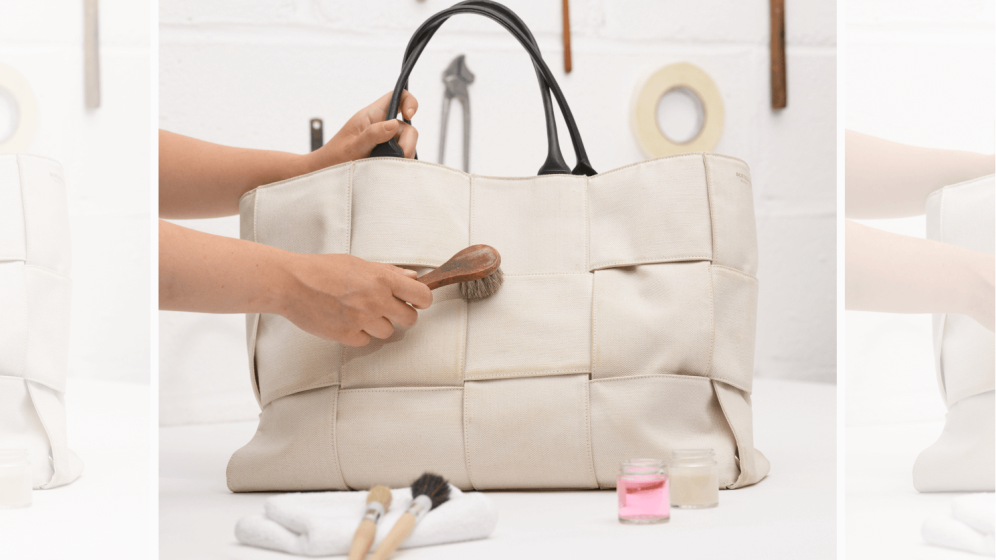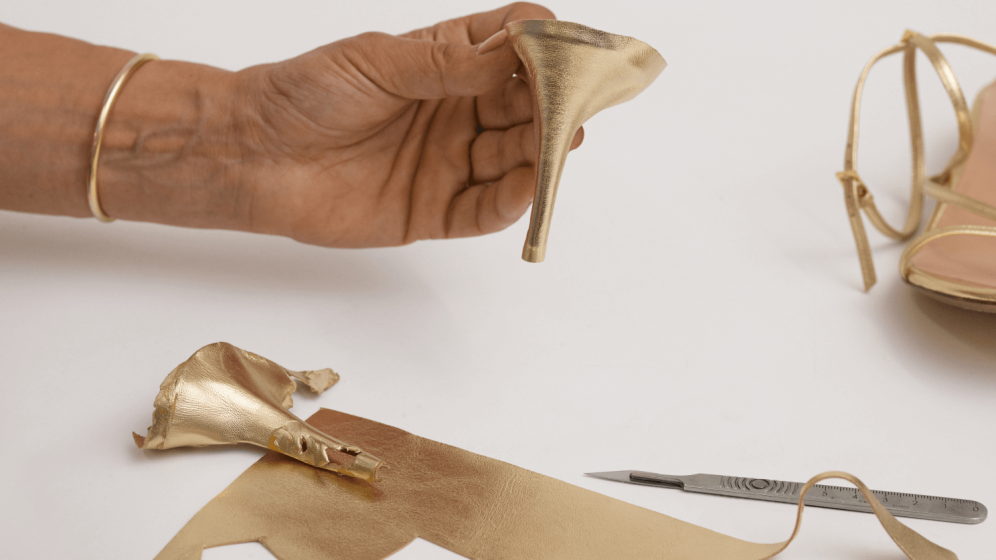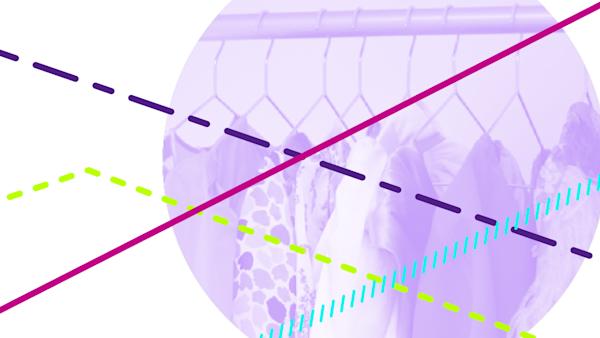Atualmente, a cadeia de suprimentos da moda e sua infraestrutura são projetadas para um fluxo unidirecional de produtos. Para que os modelos de negócios circulares funcionem, eles devem ser transformados em uma rede de suprimentos capaz de circular produtos local e globalmente.
É necessário que seja econômica e tecnicamente viável manter os produtos em circulação, o que significa que eles não podem ser prontamente enviados ao redor do mundo para serem limpos ou consertados, para depois serem revendidos ou redistribuídos. Para que os produtos circulem de forma eficaz, os serviços precisarão ser distribuídos, o que exige a colaboração efetiva de todos os participantes do setor.
A tecnologia pode ser aproveitada para aprimorar a colaboração multidirecional e deixar de lado as transações unidirecionais em direção a parcerias mutuamente benéficas. Por exemplo, o surgimento da computação em nuvem abriu novos caminhos para o trabalho colaborativo, permitindo que fábricas e empresas de moda trabalhem juntas de várias partes do mundo ao mesmo tempo. Isso permite que eles acessem dados relevantes, criando uma maneira mais rápida e eficaz de comunicação.
Colaboração para criar uma rede de suprimentos distribuída
Os modelos de negócios circulares oferecem uma oportunidade para que os produtos e seus materiais permaneçam com alto valor dentro da economia, mas a atual cadeia de suprimentos unidirecional não facilita isso. A infraestrutura para operações como revenda, aluguel, reparo e refabricação, que podem exigir manuseio, classificação, limpeza, reembalagem e redistribuição, precisa ser distribuída para que os modelos de negócios circulares reduzam efetivamente as emissões de gases de efeito estufa.
Isso exige uma rede dinâmica, diversificada e altamente conectada, baseada em parcerias locais e globais mutuamente benéficas entre todos os participantes do sistema de moda (por exemplo, fabricantes, varejistas, usuários finais e colecionadores).

The Restory

Exemplos de empresas que colocam isso em prática
The Restory oferece um serviço de restauração de sapatos e bolsas. Normalmente, ela trabalha com produtos de moda de alta qualidade e está se expandindo por meio de parcerias com varejistas, permitindo que as marcas ofereçam serviços de pós-tratamento a seus clientes (como a 'Farfetch Fix', Harvey Nichols). Essas parcerias são mutuamente benéficas.
A EverybodyWorld está preenchendo a lacuna entre cliente, fornecedor e marca, por meio da cocriação de designs. Seu par de sapatos unissex chamado 'untitled' (sem título) é baseado em um design de crowdsourcing, fabricado localmente e vem com a política de reparo vitalício da EverybodyWorld.
O instituto de pesquisa HKRITA está desenvolvendo um laboratório em Hong Kong, onde inovadores, pesquisadores, fornecedores e marcas podem se reunir, testar novas ideias e aumentar a escala mais rapidamente.
O aplicativo Sojo conecta seus usuários a costureiras ou empresas de alfaiataria locais, coletando e entregando itens de bicicleta.
Aproveitamento de tecnologias
O aproveitamento das tecnologias para possibilitar a comunicação, o rastreamento e a rastreabilidade em vários sentidos permitirá trocas facilitadas entre empresas e prestadores de serviços para gerenciar processos, como coleta, limpeza, reparo e distribuição, necessários para que os modelos de negócios circulares funcionem. Isso pode incluir tecnologias como inteligência artificial e blockchain e permitir que as empresas compartilhem mais facilmente informações que facilitem a circulação de produtos. Isso requer o desenvolvimento de casos de negócios coletivos, troca eficaz de dados e transparência.
Exemplos de empresas que colocam isso em prática
A E-on lançou o Circular ID, um protocolo digital para todo o setor que estabelece os dados essenciais de produtos e materiais (por exemplo, materiais, origem, autenticidade, preço, estilo e instruções de reciclagem) para identificar e gerenciar produtos em uma rede circular. A identificação digital desses produtos de moda pode ajudar no aluguel, na revenda e na reciclagem de roupas e acessórios.
A plataforma de aluguel Hirestreet fez uma parceria com a fornecedora de logística reversa Advanced Clothing Solutions (ACS) para gerenciar seu armazenamento e desenvolveu sua própria solução de tecnologia de marca branca para aluguéis, a Zoa, dando às marcas de moda a oportunidade de adicionar o aluguel de suas roupas como uma opção junto com a compra. As marcas fornecem o estoque, mas a Zoa cuida de toda a tecnologia de aluguel, limpeza, logística e atendimento ao cliente, com a opção de integração com o serviço de armazenamento da ACS.
Fornecedora de logística de aluguel e revenda, a Lizee ajuda marcas e varejistas a prolongar a vida útil de seus produtos, lançando, gerenciando e ampliando modelos de negócios de aluguel e revenda. A Lizee cuida da coleta, da embalagem e do envio de produtos, além de facilitar os pagamentos, supervisionar as verificações de qualidade dos produtos devolvidos, a reforma e muito mais. Ao fazer isso, ela fornece a seus parceiros dados de produtos relacionados ao uso e à qualidade, que eles podem aproveitar para aprimorar o design de seus produtos.
O Save Your Wardrobe é uma plataforma de gerenciamento de guarda-roupas habilitada para tecnologia que utiliza recibos on-line, visão computacional e IA para digitalizar guarda-roupas. A plataforma oferece um ecossistema de serviços de pós-tratamento, incluindo limpeza ecológica, reparos, alterações e serviços de fim de vida útil, como doação, para ajudar os usuários a prolongar a vida útil de suas roupas com facilidade.
O que os formuladores de políticas podem fazer para apoiar o desenvolvimento de uma rede de suprimentos
Os governos podem promover a colaboração público-privada para remover as barreiras para as empresas que oferecem serviços mais localizados, diversificados e distribuídos, incluindo reparo, reutilização e remanufatura. Eles também podem facilitar os investimentos para desenvolver as habilidades e as infraestruturas necessárias para garantir uma transição inclusiva e preencher as lacunas de inovação, abrindo caminho para um futuro mais resiliente que beneficie todos os participantes da rede de fornecimento de moda.
Baixar
Os modelos de negócios circulares estão disponíveis em: inglês
Quatro ações fundamentais para as empresas
Para garantir que seus modelos de negócios sejam circulares e para maximizar os resultados positivos, as empresas, com o apoio dos formuladores de políticas, podem adotar quatro ações principais.










